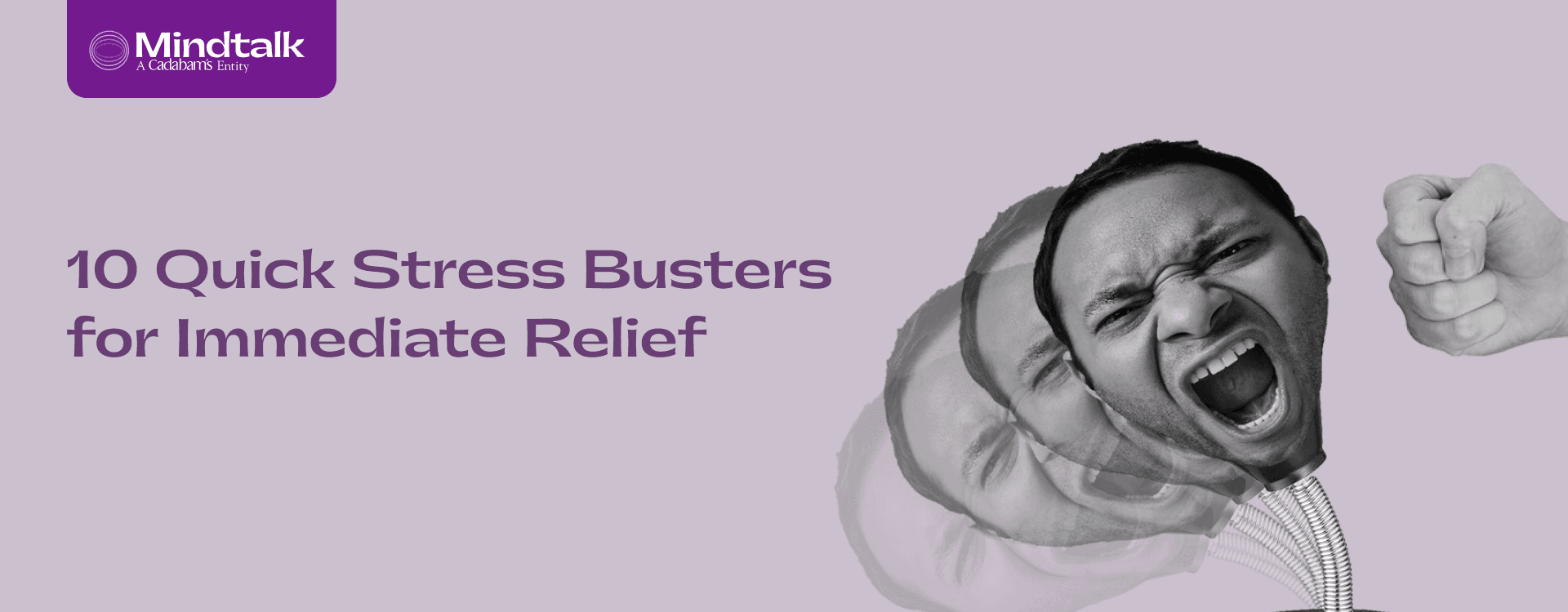The Ultimate Stress Management Plan: A Daily Guide to Finding Calm
Stress affects both body and mind, often creeping into our routines without notice. A daily plan offers structure, making it easier to manage stress before it builds up. This blog walks you through small, consistent habits to restore calm and balance.
Understanding Stress: Why It’s More Than Just Feeling Overwhelmed
Stress isn’t just a feeling; it’s a biological response. It can affect your sleep, digestion, heart rate, and mental clarity. Understanding what’s really happening inside helps you manage it more effectively.
What happens in your brain when stress builds up?
When stress hits, the amygdala sounds the alarm, triggering a fight-or-flight response. The prefrontal cortex, which handles reasoning, may become less active. This makes it harder to think clearly. Chronic stress rewires these brain regions, making us more reactive and less able to stay calm under pressure.
The link between stress, anxiety, and burnout
Unchecked stress can fuel anxiety and eventually lead to burnout. Over time, your body stays in a heightened alert state, draining your energy and emotional capacity. This can lead to fatigue, irritability, and detachment.
Recognising the signs early is key to breaking this cycle and reclaiming your wellbeing.
The science behind relaxation and cortisol control
The parasympathetic system is your body’s natural calming mechanism. It counters the stress-driven sympathetic system. When cortisol, the stress hormone, stays elevated too long, it disrupts sleep and immunity.
Breathing exercises, mindfulness, and quality sleep all help activate relaxation pathways and lower cortisol to a healthier baseline.
Morning Stress-Proofing Routine: How to Start the Day Right
Your first hour awake can influence how you handle stress all day. A calm, focused morning routine helps stabilise your mood and energy, setting a strong foundation for resilience and clarity.
The power of mindful mornings
Starting your day with mindfulness—through meditation, journaling, or slow breathing can help calm your nervous system before the world gets loud. Even five minutes of stillness lowers morning cortisol levels.
These habits anchor you in the present, improve focus, and build emotional readiness for whatever the day brings.
Nutrition for stress resilience
What you eat affects how your body handles stress. Foods rich in magnesium, omega-3s, and complex carbs support your nervous system. Think oatmeal, nuts, leafy greens, and fatty fish.
Avoid excessive caffeine and sugar, which can spike cortisol and anxiety. Hydration also plays a quiet but vital role.
Movement as a mood booster
Physical activity—especially in the morning—releases endorphins, which naturally lift mood and reduce stress. A short yoga flow, gentle stretching, or a brisk walk helps regulate cortisol and boost energy.
Even ten minutes can make your body feel grounded and your mind more focused for the rest of the day.
Handling Work & Daily Responsibilities Without Feeling Overwhelmed
Daily responsibilities can be less draining when approached with structure. By planning ahead and simplifying decisions, you create mental space, making your workload feel more manageable and your focus more sustained.
How to structure your workday for lower stress
Organising your workday into blocks can reduce decision fatigue and stress. Group similar tasks together; this is called task batching. Set realistic daily goals rather than long to-do lists.
Leave buffer time between meetings. This way, your mind stays clear, your work stays focused, and the stress doesn’t pile up.
The Pomodoro technique & other focus boosters
Work in 25-minute intervals, known as the Pomodoro technique, with 5-minute breaks in between. It prevents burnout and keeps your mind sharp. Pair this with focus-enhancing tools like instrumental music or apps that block distractions.
These small strategies help you stay present, finish tasks faster, and feel more in control.
The role of breaks, music, and environment in mental clarity
A tidy, well-lit space makes a big difference. Clutter increases stress, while natural light and fresh air improve focus. Play calming music or ambient sounds to stay grounded. Take short, regular breaks—step outside or stretch.
Your environment can either drain or recharge you, so set it up mindfully.
Midday Reset: How to Recharge Your Energy for the Rest of the Day
Midday slumps are common, but avoidable. A purposeful lunch break with light movement or relaxation techniques can restore focus. This short pause can help you finish the day with more clarity and energy.
Why lunchtime habits affect afternoon stress levels
What you eat at lunch impacts your afternoon mood. A balanced plate with protein, complex carbs, and healthy fats helps maintain stable blood sugar and energy. Avoid heavy, greasy meals or too much sugar, which can lead to energy crashes.
Hydrate well. These small adjustments support your body’s natural rhythm and calm.
Quick midday stress relief techniques
Even a five-minute pause can reset your stress levels. Try deep breathing—inhale for four counts, exhale for six. A short walk boosts endorphins and breaks mental fatigue. Power naps under 20 minutes can improve alertness.
These small, intentional actions restore clarity and lower stress for the second half of your day.
The best foods for sustained energy & calm
Choose foods that nourish both brain and body. Avocados, spinach, and salmon support cognitive function. Lean proteins like eggs or chicken keep you full without spiking sugar.
Nuts and seeds offer magnesium, which calms the nervous system. Snack smart with nutrient-dense options to avoid dips in mood and focus.
Managing Emotional Stress: Dealing with Anxiety & Negative Thoughts
Managing emotional stress involves focusing on your thoughts and emotions. By recognising triggers and applying techniques to shift your mindset, you can cope more effectively and reduce the impact of stress on your well-being.
How to stop overthinking & self-doubt
Overthinking often fuels self-doubt. The first step is recognising these negative thought patterns. To break the cycle, take deep breaths, focus on the present, and remind yourself of past successes.
Interrupting these loops can help reduce anxiety and restore emotional balance.
Using mindfulness & gratitude to shift your mindset
Mindfulness and gratitude practices help shift your mindset. Mindfulness brings your attention to the present, reducing worry about the future.
Practising gratitude helps refocus your thoughts from fear to positivity, encouraging a calmer, more grounded perspective.
When to seek support
If stress becomes overwhelming, seeking support is essential. Therapy offers professional guidance, while coaching provides motivation. Journaling allows you to process your thoughts and emotions.
Reaching out for support is a proactive step towards mental well-being.
The Evening Wind-Down Routine for Better Sleep & Mental Recovery
Quality sleep is vital for mental recovery. Establishing an evening routine can help you relax, reduce stress, and ensure restorative sleep. This routine can improve your overall well-being and help you manage daily challenges more effectively.
Why poor sleep fuels stress & how to fix it
Lack of sleep raises cortisol levels, leading to increased stress and mental fog. To improve sleep, maintain a regular sleep schedule, avoid caffeine late in the day, and create a calming bedtime routine. These changes can help reset your body’s stress response.
The best nighttime rituals for deep relaxation
To relax before bed, try taking a warm shower, which can soothe both body and mind. Avoid screens for at least an hour before sleep to reduce blue light exposure. Drinking calming teas, like chamomile, can further promote relaxation and better sleep.
How to create a stress-free sleep environment
A stress-free sleep environment is crucial for rest. Keep your bedroom cool, dark, and quiet. Minimise clutter to create a peaceful atmosphere. Consider using blackout curtains and a white noise machine to enhance your sleep quality and aid mental recovery.
Nutrition & Lifestyle Hacks for Long-Term Stress Resilience
Resilience isn’t built overnight—it’s the sum of small choices. What you eat, drink, and do each day subtly strengthens your stress response, helping you feel more in control over time.
The best foods for reducing cortisol & boosting serotonin
Certain foods naturally regulate your stress hormones. Dark chocolate boosts serotonin. Fatty fishlike salmon are rich in omega-3s that reduce cortisol. Berries offer antioxidants that protect your brain.
Green tea contains L-theanine, which promotes calm focus. Adding these to your meals can gradually improve mood and lower stress levels.
The role of hydration & gut health in stress reduction
Dehydration increases cortisol. Aim for at least two litres of water daily. Your gut and brain are deeply connected. Probiotics and fermented foods like yoghurt, kimchi, or kefir help maintain balance.
A healthy gut reduces inflammation, which in turn lowers stress. Small shifts in diet can support long-term calm.
Simple daily habits to keep stress levels low
Start with sunlight—just 10 minutes in the morning improves mood. Laugh more, even if it’s from a funny video. Take mindful breaks to breathe or stretch. Set phone-free hours to reduce digital overload.
These habits, though simple, build a daily buffer against stress and make you feel more grounded.
Immediate Stress Relief: What to Do When You’re Overwhelmed Right Now
When stress spikes, you need quick tools. These science-backed techniques help ground your body and calm your mind—so you can reset in the moment and stop spirals before they grow.
The 5-4-3-2-1 grounding technique for panic moments
Name 5 things you see, 4 you can touch, 3 you hear, 2 you smell, 1 you taste. This sensory scan pulls you out of a racing mind and into the present. Use it when you feel panic rising—it reactivates your rational brain and calms physical anxiety responses.
Deep breathing exercises that actually work
Try box breathing: inhale 4, hold 4, exhale 4, hold 4. Or 4-7-8 breathing to slow your heart rate. Long exhales activate the parasympathetic nervous system. Even just three minutes can change your state.
These techniques are portable, quick, and backed by research for reducing immediate stress.
The quickest way to shift out of a stress spiral
Splash cold water on your face; it jolts your nervous system into alert calm. Step outside for a brisk walk—movement resets stress hormones. Or put on music that shifts your mood.
These tricks don’t solve everything, but they can interrupt spirals so you can think clearly and feel steady.
Committing to a Stress-Free Lifestyle with Mindtalk
Consistency is key. By making small, intentional choices each day, whether it’s mindful mornings, balanced meals, or better sleep, you’re not just managing stress; you’re reshaping your life.
At Mindtalk, we understand that stress looks different for everyone. That’s why our experts offer personalised guidance to help you build a plan that fits your needs. Explore our resources, connect with a professional, and take your next step towards sustainable calm.
Meet Our Stress Management Experts




